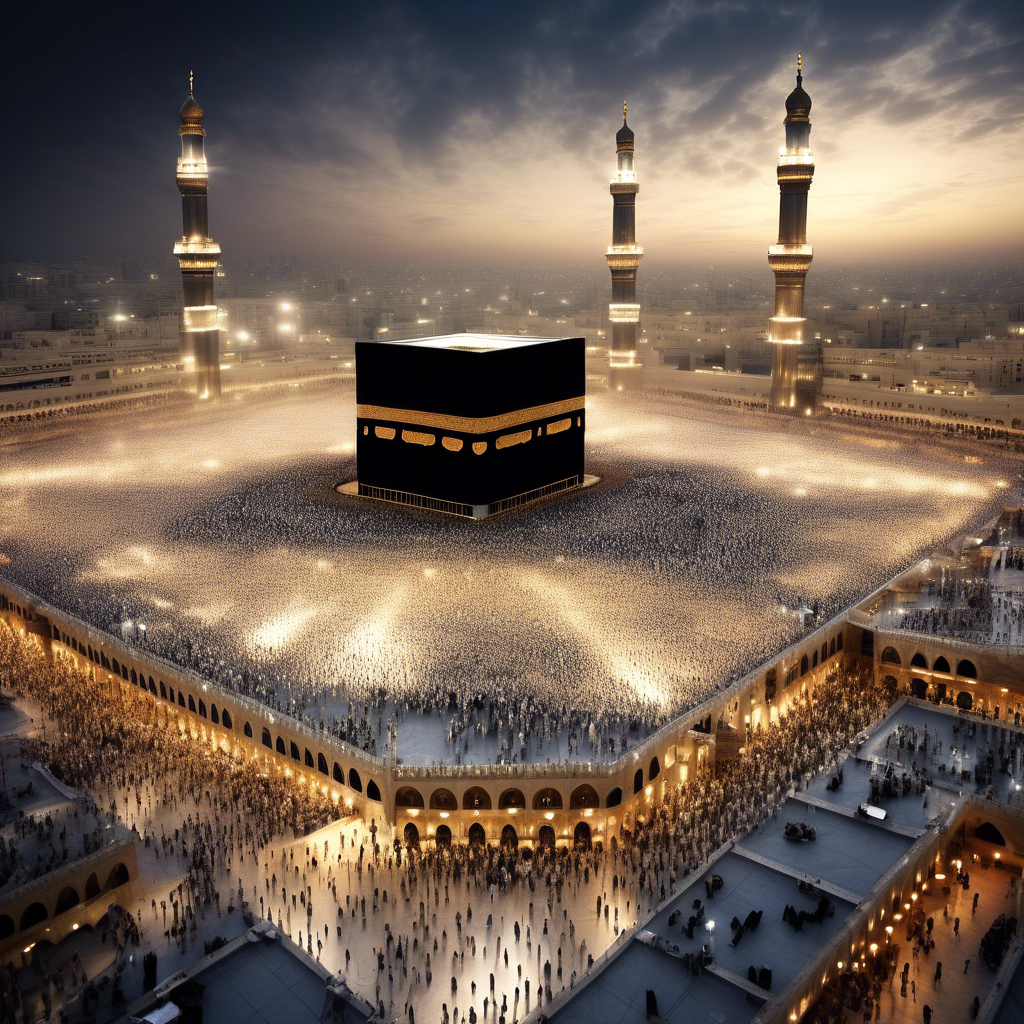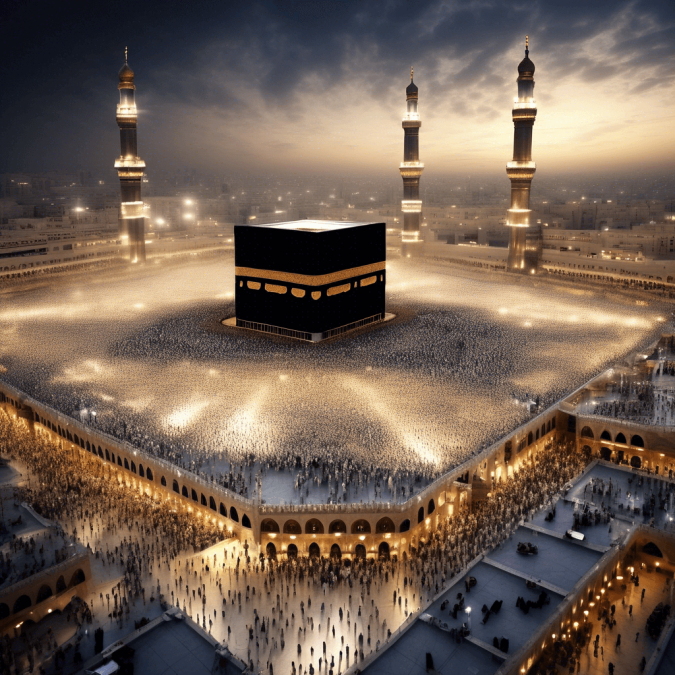
Islam is a monotheistic religion founded by Prophet Muhammad in the 7th century. It is based on the teachings of the Quran, considered by Muslims as the word of God. Islam encompasses five pillars: Shahada (faith), Salah (prayer), Zakat (charity), Sawm (fasting), and Hajj (pilgrimage). Muslims believe in the oneness of God, angels, prophets, and the Day of Judgment. The Quran serves as a guide for personal conduct, social justice, and the establishment of an Islamic state. Islam has diverse sects such as Sunni and Shia, and varies in practices and interpretations across countries and cultures. It has had significant historical, cultural, and political impacts, making it one of the world’s major religions with over 1.8 billion followers.
One of the most well-known stories in Islam is the story of Prophet Muhammad and the revelation of the Quran. According to Islamic tradition, around the year 610 CE, when Muhammad was in his 40s, he received his first revelation from the angel Gabriel while meditating in a cave on Mount Hira near Mecca. The angel commanded him to recite the words “Iqra” (Read or Recite), which became the first verses of the Quran.
Initially, Muhammad was confused and overwhelmed by the experience, but as time went on, he continued to receive revelations from God through the angel Gabriel. Over a period of 23 years, these revelations were compiled into what is now known as the Quran, the holy book of Islam.
Muhammad began to preach the message of Islam, calling people to worship one God and live righteous lives. Despite facing opposition and persecution from the powerful tribes of Mecca, Muhammad’s message began to attract followers, known as Muslims. In 622 CE, he and his followers migrated to the city of Medina, an event known as the Hijra, which marks the beginning of the Islamic calendar.
In Medina, Muhammad established a community based on Islamic principles and continued to spread the message of Islam. Through a series of battles and negotiations, he eventually unified the tribes of Arabia under the banner of Islam.
Prophet Muhammad passed away in 632 CE, but his teachings and the Quran continued to spread throughout the Arabian Peninsula and beyond. Today, Islam is one of the world’s major religions, with millions of followers around the globe, all tracing their faith back to the revelations received by Prophet Muhammad in the cave of Mount Hira.
In Islam, God is referred to as Allah, which is the Arabic word for God. Muslims believe in the oneness of God, known as Tawhid, which is the central concept in Islamic theology. God is seen as the creator and sustainer of the universe, the all-powerful and all-knowing being who is transcendent and beyond human comprehension.
According to Islamic belief, Allah is merciful and compassionate, and has 99 names or attributes that describe various aspects of His nature, such as the Merciful, the Compassionate, the All-Knowing, the All-Wise, and the All-Powerful.
Muslims are called to worship and obey God, to seek His guidance, and to submit to His will. Prayer, fasting, charity, pilgrimage, and other acts of worship are ways in which Muslims express their devotion to Allah and seek to strengthen their relationship with Him.
Islam teaches that God has sent prophets and messengers throughout history to guide humanity and reveal His will. The final prophet in Islam is Muhammad, who is considered the seal of the prophets.
Overall, the concept of God in Islam emphasizes His unity, transcendence, and mercy, and serves as the foundation of the faith for Muslims around the world.
Islam does not have a formal system of social classes like the caste system in Hinduism. However, Islamic societies have historically had social stratification based on various factors such as wealth, occupation, education, and tribal or familial connections. While Islam teaches equality and the brotherhood of all believers, socioeconomic disparities and hierarchies have existed in Muslim-majority countries throughout history.
In some Islamic societies, there have been divisions based on wealth and social status, with elite classes enjoying privileges and power while lower classes face social and economic challenges. This can be seen in the distribution of wealth, access to education and healthcare, and opportunities for advancement.
Islamic teachings emphasize social justice, charity, and compassion towards the less fortunate, and encourage Muslims to give to the needy, support the marginalized, and treat all individuals with fairness and respect. The concept of Zakat, the obligatory charity, is intended to help redistribute wealth and support those in need.
It is important to note that social structures and hierarchies in Islamic societies can vary widely based on cultural, historical, and regional factors. While Islam promotes equality and justice, social class distinctions have been present in many Muslim-majority countries, influencing access to resources, opportunities, and power.
Islam has a rich literary tradition with many important and influential books that have shaped Islamic thought, theology, law, and culture. Here are some key books in Islam:
1. The Quran: The Quran is the holy book of Islam, believed by Muslims to be the literal word of God as revealed to Prophet Muhammad. It serves as a guide for personal conduct, social justice, and the establishment of an Islamic state.
2. Sahih al-Bukhari: Sahih al-Bukhari is one of the most important collections of hadith (sayings and actions of Prophet Muhammad) in Sunni Islam. Compiled by Imam Bukhari, it is considered one of the most authentic sources of Islamic teachings.
3. Sahih Muslim: Like Sahih al-Bukhari, Sahih Muslim is another important collection of hadith compiled by Imam Muslim. It is highly regarded by Sunni Muslims as a reliable source of Prophetic traditions.
4. Al-Muwatta: Al-Muwatta is a collection of hadith compiled by Imam Malik, one of the founders of the Maliki school of Islamic jurisprudence. It is considered one of the earliest and most authoritative collections of hadith.
5. The Sealed Nectar (Ar-Raheeq Al-Makhtum): This biography of Prophet Muhammad, written by Safi-ur-Rahman al-Mubarakpuri, provides a detailed account of the life of the Prophet from his birth to his death.
6. The Revival of the Religious Sciences (Ihya Ulum al-Din): Written by Imam al-Ghazali, this influential work explores various aspects of Islamic spirituality, ethics, and jurisprudence. It remains a key text in Islamic philosophy and mysticism.
7. The Autobiography of Malcolm X: This autobiography of the famous African-American Muslim leader Malcolm X, written with Alex Haley, provides insights into his journey to Islam, his activism, and his evolving views on race and religion.
These are just a few examples of important books in Islam that have had a significant impact on Islamic scholarship, theology, and culture. There are many more books in Islamic literature that cover a wide range of topics and disciplines within the religion.
Islam is a religion with several important rituals that are central to the faith and practice of Muslims. Here are some of the key rituals in Islam:
1. Shahada: The Shahada, or declaration of faith, is the first pillar of Islam. It is the testimony that there is no god but Allah, and that Muhammad is His messenger. By reciting the Shahada, a person formally declares their belief in the oneness of God and the prophethood of Muhammad.
2. Salah: Salah, or prayer, is the second pillar of Islam and is performed five times a day at prescribed times. Muslims face the Kaaba in Mecca while praying and recite verses from the Quran in Arabic. Prayer is a way for Muslims to connect with God, seek guidance, and express gratitude.
3. Zakat: Zakat is the third pillar of Islam and refers to the obligatory charity that Muslims are required to give to those in need. It is usually calculated as a percentage of a person’s wealth and is meant to purify one’s wealth and help alleviate poverty in the community.
4. Sawm: Sawm, or fasting, is the fourth pillar of Islam and is observed during the month of Ramadan, the ninth month of the Islamic lunar calendar. Muslims fast from dawn to sunset, abstaining from food, drink, and other physical needs. Fasting is seen as a way to develop self-discipline, empathy for the less fortunate, and spiritual growth.
5. Hajj: Hajj is the fifth pillar of Islam and is the pilgrimage to the holy city of Mecca that every able-bodied and financially capable Muslim is obligated to perform at least once in their lifetime. Hajj takes place during the Islamic month of Dhu al-Hijjah and involves a series of rituals that commemorate the actions of Prophet Ibrahim and his family.
These five pillars of Islam are the core rituals that define the faith and practice of Muslims. In addition to these pillars, there are other rituals and practices within Islam, such as reciting the Quran, performing acts of kindness and charity, attending Friday prayers, and observing various Islamic festivals and occasions.
In Islam, religious rules and guidelines are derived from the Quran, the holy book of Islam, and the teachings and practices of Prophet Muhammad, known as the Sunnah. These rules and guidelines cover various aspects of life, including worship, ethics, social interactions, personal conduct, and legal matters. Here are some key religious rules in Islam:
1. Five Pillars of Islam: The Five Pillars are the core religious duties that every Muslim is expected to fulfill. They include the declaration of faith (Shahada), prayer (Salah), charity (Zakat), fasting (Sawm), and pilgrimage (Hajj).
2. Halal and Haram: Islam has rules regarding what is permissible (halal) and what is forbidden (haram) for Muslims. These rules cover various aspects of life, including food and drink, clothing, behavior, and interactions with others. For example, consuming pork, alcohol, or any form of interest (riba) is considered haram.
3. Modesty and Dress Code: Islam emphasizes modesty in dress and behavior for both men and women. Muslims are encouraged to dress modestly, covering their bodies and dressing in a way that is not revealing or provocative. For women, this often includes wearing a headscarf (hijab) and loose-fitting clothing.
4. Gender Relations: Islam has guidelines regarding interactions between men and women to maintain modesty and respect. For example, Muslims are encouraged to lower their gaze and avoid unnecessary physical contact with members of the opposite sex who are not close relatives.
5. Ethics and Morality: Islam emphasizes ethical behavior, honesty, integrity, compassion, and justice. Muslims are encouraged to treat others with kindness and respect, fulfill their obligations, and avoid lying, cheating, and harming others.
6. Islamic Jurisprudence: Islamic law, known as Sharia, provides guidelines for legal and ethical behavior based on the Quran and the Sunnah. It covers various aspects of life, including family law, business transactions, criminal justice, and personal conduct.
These are just a few examples of the religious rules and guidelines in Islam. The interpretation and application of these rules may vary among different Muslim communities and scholars, but they serve as a framework for believers to live their lives in accordance with Islamic teachings.
